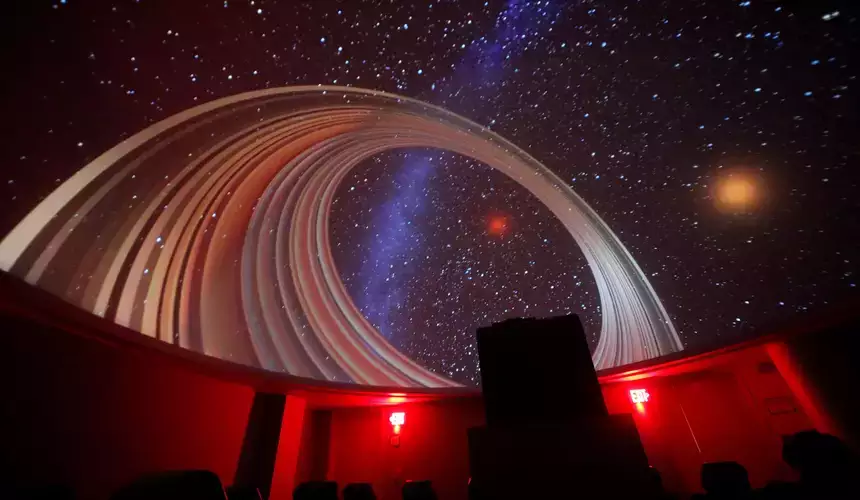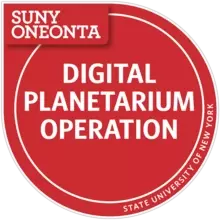Overview
SUNY Oneonta’s Digital Planetarium Operation Microcredential provides valuable science communication and planetarium operation experience which you can bring to your future workplace, whether in the museum or planetarium field, or as a K-12 teacher with a focus on a science topic.
Department
Program Type
Area of Study
Delivery Mode
Required Courses
Through a two-course sequence of either Descriptive Astronomy or Our Solar System and then Planetarium Operations, you will learn the necessary skills to operate a digital planetarium and gain enough introductory background knowledge to present basic live planetarium shows about objects in the night sky.
- ASTR 1080 - Descriptive Astronomy or ASTR 2700 - Our Solar System
- ASTR 2730 - Planetarium Operations
- ASTR 1080 - Descriptive Astronomy - students are introduced to a variety of astronomy topics, including constellations, planetary systems, star properties, and galaxy structure. They will gain enough basic knowledge to speak intelligently about objects in the night sky, and have the foundational knowledge necessary to conduct more in depth explorations on astronomy topics they might find interesting to include in a planetarium show.
- ASTR 2700 - Our Solar System - students learn how to identify constellations, observe solar system objects in the night sky, and explore the basic properties of planets, comets, asteroids, and the sun. This class covers solar system objects at a slightly more advanced and mathematical level than is taught in Descriptive Astronomy, while still involving important general topics like star brightness, seasons, moon phases, etc. that are often discussed in planetarium shows.
- ASTR 2730 - Planetarium Operations - students actually learn how to use our digital planetarium. They learn how to operate the software that controls the sky, they design their own planetarium show content, and they learn best practices for presenting scientific content to people of all ages.
Competencies
Upon completion of the program, you will be able to demonstrate the following competencies:
- a working understanding of basic astronomical objects and phenomena. Have an expanded understanding of astronomical topics with common misconceptions (seasons, moon phases, etc.) and be able to communicate these concepts accurately to the public;
- a basic knowledge of easily observable phenomenon in the day and nighttime sky. This includes the motions of the stars over time, moon phases, the sun, planets, Messier objects, and constellations and the stories that accompany them;
- technological skills necessary to operate a digital planetarium and create a variety of scientifically accurate custom show content. This may come in the form of digital visualizations, videos, and written or voice-over scripts;
- basic computer science and coding skills necessary to create custom planetarium show content;
- public speaking skills through the presentation of science content during a planetarium show;
- ability to effectively communicate astronomy and other science concepts to people of all ages, including young children and lifelong learners; and
- have a working understanding of how planetariums operate, how show schedules are designed, and what funding resources are available for science museums and planetariums.
These skills are transferrable to any digital planetarium regardless of the software used to display the stars.
You will receive both a notation on your transcript and a digital badge.
Eligibility
Enrolled students
2 semesters
6 Credits
N/A
NYS resident = $2,020
Non-resident = $4,625

